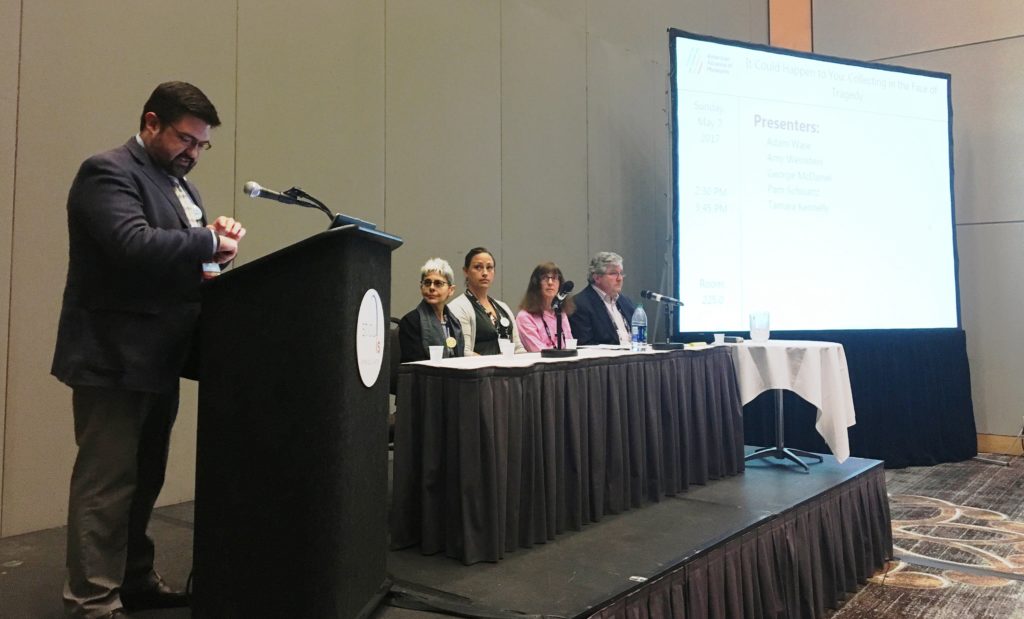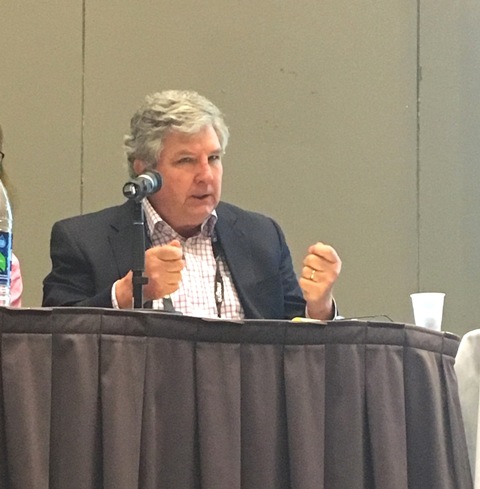It Could Happen to You: Collecting in the Face of Tragedy
American Alliance of Museums Annual Meeting – May 2017
UPDATED AUGUST 2017
This past May, I participated in an important session at the annual conference of the American Alliance of Museums (AAM). Joining me were staff from the Orange County Regional History Center, the archives of Virginia Tech University, and the National 9/11 Memorial and Museum. The moderator was Dr, Adam Ware, Historian and Research Librarian with the Orange County Regional History Center.
We were speaking to an audience of museum professionals from across the nation. Our goal was to make the point that the tragedies we have encountered with 9/11 and at Virginia Tech, the Pulse nightclub in Orlando, and the Mother Emanuel AME Church in Charleston, SC, were not aberrations, but are events that museums today need to prepare for. While panelists were diverse in backgrounds and perspectives, patterns emerged from our experiences that could equip other professionals for subsequent crises. We learned, for example, that responses take a professional as well as a personal toll, and become both a blessing and a burden to the museum. Thus, the need to plan now. No one knows where the next hateful tragedy will occur, but if recent history is a guide, it will. Unfortunately, Charlottesville has become the most recent example.

Moderator Adam Ware directs questions to panelists L-R: Amy Weinstein, Pam Schwartz, Tamara Kennelly, and George McDaniel.
Amy Weinstein – Director of Collections & Senior Oral Historian at 9/11 Memorial, who served as a fieldwork curator for the New York Historical Society in their collecting endeavor after the 9/11/2001 World Trade Center attack.
Pam Schwartz – Chief Curator at Orange County Regional History Center in Orlando, FL, who spearheaded the collecting efforts after the 2016 shooting at Pulse Nightclub.
Tamara Kennelly – University Archivist at Virginia Tech in Blacksburg, VA, who coordinated the collecting efforts after the 2007 shooting at Virginia Tech.
George McDaniel – Director Emeritus of Drayton Hall in Charleston, SC, initiated a museum committee to collect memorabilia and produce a commemorative exhibit after the 2015 shooting at Mother Emanuel AME Church.

McDaniel describes efforts to form a committee to curate the expressions of grief in the aftermath of the shootings at Emanuel AME in Charleston, SC.

The audience was interested in finding out when the panelists first knew they needed to get involved as professionals and what had changed in the years since the event. Also, what hadn’t changed? What succeeded in terms of their efforts? What didn’t?
At the end of the session we shared a list compiled from panelists’ experiences–important points for museum professionals to consider before catastrophe strikes their communities:
- Should our museum collect tin the face of tragedy?
- Is it important to our community this event be in its historical record?
- Does it fit the collecting mission of our institution?
- Do we have the resources to do so?
- Legally, can we collect from the site?
- Who else will we need to work with?
- How soon is too soon to collect?
- How do we inform and educate our community about what we’re doing?
- Can we alert family or survivors and other directly involved parties to build their trust?
- How will we keep our staff and current collection safe?
- How much and what should we collect? (artifacts, oral histories, documentary photos)
- What tools and supplies will we need for collecting temporary memorials?
 George W. McDaniel, Ph.D., is President of McDaniel Consulting, LLC, a strategy firm that helps organizations use history to build bridges within itself and to its broader constituents. The company’s tag line, “Building Bridges through History,” is grounded in McDaniel’s personal beliefs and his experience in site management, preservation, education, board development, fundraising, and community outreach. Rather than using history to divide us, he strives to help organizations use history, especially local history, to enhance cross-cultural understanding and to support local museums, preservation, and education. Dr. McDaniel recently led volunteer efforts with Emanuel AME Church and historical organizations in Charleston to use historic preservation to enhance racial reconciliation and healing.
George W. McDaniel, Ph.D., is President of McDaniel Consulting, LLC, a strategy firm that helps organizations use history to build bridges within itself and to its broader constituents. The company’s tag line, “Building Bridges through History,” is grounded in McDaniel’s personal beliefs and his experience in site management, preservation, education, board development, fundraising, and community outreach. Rather than using history to divide us, he strives to help organizations use history, especially local history, to enhance cross-cultural understanding and to support local museums, preservation, and education. Dr. McDaniel recently led volunteer efforts with Emanuel AME Church and historical organizations in Charleston to use historic preservation to enhance racial reconciliation and healing.
McDaniel is also the Executive Director Emeritus of Drayton Hall, a historic site in Charleston, SC, owned by the National Trust for Historic Preservation. He retired from Drayton Hall in 2015 after 25 years of distinguished service.

 McDaniel Consulting LLC is a strategy firm that helps organizations use history to build bridges within itself and its broader constituents.
McDaniel Consulting LLC is a strategy firm that helps organizations use history to build bridges within itself and its broader constituents.